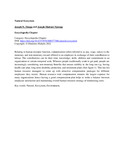| dc.description.abstract | Relating to human resource function, compensation (often referred to as pay, wage, salary) is the monetary and non-monetary reward offered to an employee in exchange of their contribution to labour. The contributions can be their time, knowledge, skills, abilities and commitment to an organization or certain temporal work. Whereas people traditionally work to get paid, people are increasingly considering non-monetary benefits that ensure stability in the long run e.g. having health care plan, long-term disability protection, and retirement plans (See figure 1). This has led human resource managers to come up with attractive compensation packages for different employees they recruit. Human resource total compensation remains the largest expense for many organizations hence having a good compensation plan helps to strike a balance between employee satisfaction and maintaining overall human resource strategy of minimizing costs. | en_US |

